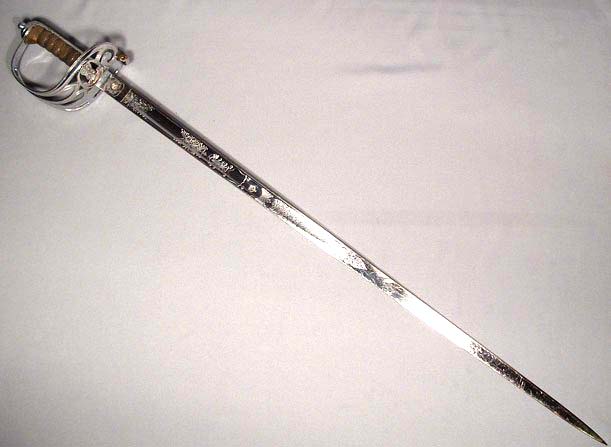
The photo below shows a British Rifle Regiment Officer’s Sword dating from King George V's time. Its nickel-plated steel basket hilt incorporates a crowned bugle motif, wire-bound shark skin covered grip, straight single-edged blade with fuller and spear point finely etched with crowned royal cipher “G.R. V.”, panels of foliage bugle and crowned shield while its forte is etched with a 6-pointed star (not the Jewish one). This sword was used during WWI but I think it is still used today during military parades. An excellent dress sword.
 Attachment: 46.69 KB
Attachment: 46.69 KB


It's a real beauty, isn't it? Definitely one of my favourite modern military swords so far. :)
*sigh* Makes me wish I had lots of money to spend on antiquities. :(
*sigh* Makes me wish I had lots of money to spend on antiquities. :(
| Anders Backlund wrote: |
| It's a real beauty, isn't it? Definitely one of my favourite modern military swords so far. :)
*sigh* Makes me wish I had lots of money to spend on antiquities. :( |
These later swords are still pretty plentiful and can be be had for less than this dealer is asking.
This sword is a British Pattern 1827 Rifle Officer's sword. The original iteration of this pattern was similar to the Pattern 1822 Infantry Officer's sword except it had a steel hilt (as opposed to gilt brass), a fixed inboard guard (as opposed to hinged), and a light infantry bugle cartouche (instead of the cypher of the monarch). It would have had the same ~32" pipe back blade.
In the late 1840s the pipe back blade was largely abandoned in favor of the fullered "Wilkinson" style blade that is found on Pattern 1845 and Pattern 1854 Infantry officer's swords.
In 1892 a new blade pattern was approved for infantry officers, and it is the blade pattern found on the P1827 featured in this thread. This blade has a "dumbbell" cross section for ~1/2 the blade, which makes for a strong thrust-oriented blade that is blunt for just over half of its length. The last ~2/5 of the blade can be sharpened. While it was approved in 1892, it is not commonly found on the P1854 hilts. Rather, it is most often found on P1895 and P1897 Infantry Officer's Swords, P1827 Rifle Officer's Swords, and P1854 Guards Officer's Swords, and occasionally P1821 Artillery Officer's Swords.
The example pictured above could date to WW1, but without information on the maker it would be hard to say for certain since George V reigned 1910-1936. However, tens of thousands of swords were manufactured during the Great War. Wilkinsons alone supplied 10,500 P1897 swords between 1914-1918.
Jonathan
ADDED: There are two blade weights/sizes that can be found with this type of sword; a thinner and lighter "piquet" weight blade for dress or levee, and a more robust service blade. The one pictured above appears to be the latter.
The Ghurka light infantry regiments still use the 1827 hilt joined to the 92 blade Jonathan, as do the Regiments of Foot Guards, in their case with their badge replacing the Light Inf. bugle
David
David
| D Critchley wrote: |
| The Ghurka light infantry regiments still use the 1827 hilt joined to the 92 blade Jonathan, as do the Regiments of Foot Guards, in their case with their badge replacing the Light Inf. bugle
David |
Hi David,
You are right, and those that are marked to a Ghurka regiment fetch quite healthy prices, even if they are relatively new (ERII marked).
Here is a nice close-up of the light infantry bugle badge on a P1827 Rifle Officer's Sword. Note that this one has the fullered "Wilkinson" style blade.
[ Linked Image ]
Anders, I agree with you. It's a real beauty and I feel like I want to 'own' that sword.
I rather prefer the Napoleonic Wars era 95th Rifles Officers' sabers which were pretty much the same as the Light Infantry Officers' sabers of that same period. For an example, please see the item below but I have seen them rather more elaborated with royal cyphers in the guards and engraved blades as well as leather covered wooden scabbards:
http://www.thelanesarmoury.co.uk/shop/viewpho...amp;phqu=5
http://www.thelanesarmoury.co.uk/shop/viewpho...amp;phqu=5
Here are the engravings found on the blade of the British Rifle Regiment Officer's Sword.
[ Linked Image ]
[ Linked Image ]
Last edited by Shahril Dzulkifli on Tue 05 Feb, 2008 4:03 pm; edited 1 time in total
The blade is actually acid etched, as opposed to engraved. Engraving on British military swords fell out of practice during the first quarter of the 19th century.
Jonathan
ADDED:
Regiments who earned battle honours were permitted to have the honours etched on their sword blades. IMO, these etchings make for particularly attractive blades. Below are some photos of a blade from a Pattern 1854 Guards Officer's Sword. The P1854 Guards Officer's Sword is identical to the P1827 Rifle Officer's Sword except that the strung bugle cartouche is replaced by the badge of a Guards regiment. This Guards sword was sold by Wilkinson in 1898 and belonged to the Honourable Walter A. Trefusis of the Scots Guards.




Jonathan
ADDED:
Regiments who earned battle honours were permitted to have the honours etched on their sword blades. IMO, these etchings make for particularly attractive blades. Below are some photos of a blade from a Pattern 1854 Guards Officer's Sword. The P1854 Guards Officer's Sword is identical to the P1827 Rifle Officer's Sword except that the strung bugle cartouche is replaced by the badge of a Guards regiment. This Guards sword was sold by Wilkinson in 1898 and belonged to the Honourable Walter A. Trefusis of the Scots Guards.




The P1854 Guards Officer's Sword is an interesting piece. I like its etchings. They look nice, though.
As comparision the M1803 infantry officer saber, here one for grenadier officers.(see grenade above royal cipher)
Received it 2 weeks ago and i´m pretty happy with it.
Pics by seller-i´m allowed to post.
 Attachment: 51.07 KB
Attachment: 51.07 KB
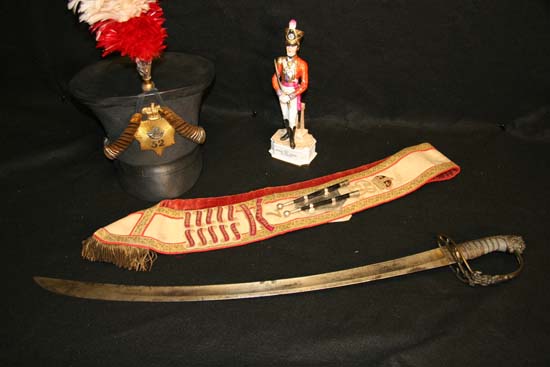
 Attachment: 83.27 KB
Attachment: 83.27 KB
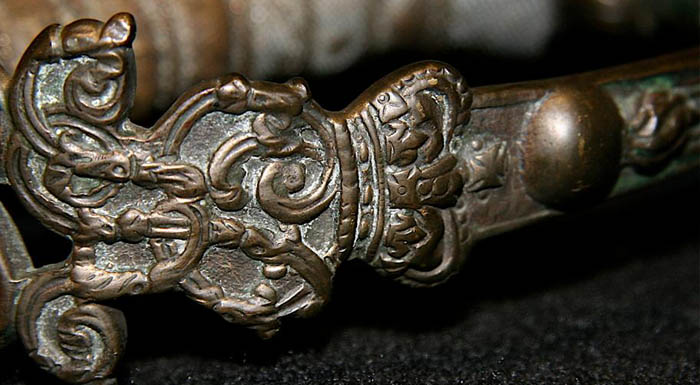
 Attachment: 58.95 KB
Attachment: 58.95 KB
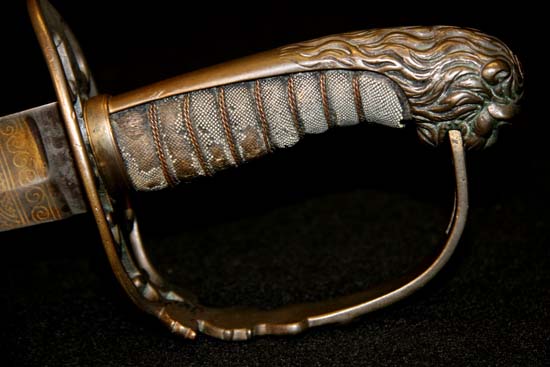
Received it 2 weeks ago and i´m pretty happy with it.
Pics by seller-i´m allowed to post.



@Anders
Antique swords aren´t very expenisve if you choose a period not collected by everybody.
Napoleonics are expensive (unlucky me)
Japanese are expensive
Mediaval are absolutly unaffordable.
But if you look for swords like the one posted above from mid 19th you´ll get some very nice swords for little money.
my first sword ever was a dutch pallasch from ~1850-no rost, no dings-very good condtion.
I payed $250 incl S/H from US to Germany-you´ll never get a decent replica for that money.
Start collection mid 19th european cavalry sabers or something similar-you´ll find lots of nice pieces for little money.
 Attachment: 84.35 KB
Attachment: 84.35 KB
[ Download ]
 Attachment: 71.95 KB
Attachment: 71.95 KB
[ Download ]
Antique swords aren´t very expenisve if you choose a period not collected by everybody.
Napoleonics are expensive (unlucky me)
Japanese are expensive
Mediaval are absolutly unaffordable.
But if you look for swords like the one posted above from mid 19th you´ll get some very nice swords for little money.
my first sword ever was a dutch pallasch from ~1850-no rost, no dings-very good condtion.
I payed $250 incl S/H from US to Germany-you´ll never get a decent replica for that money.
Start collection mid 19th european cavalry sabers or something similar-you´ll find lots of nice pieces for little money.
[ Download ]
[ Download ]
Last edited by Peter G. on Thu 31 Jan, 2008 8:08 am; edited 3 times in total
The Pattern 1803 was the regulation sword for light infantry officers and flank company officers until it was replaced by the Pattern 1822 Infantry Officer’s Sword. Rifle officers would have carried the P1822 for a short span of time as the 1827 regulations called for a new steel hilt. The change from pattern to pattern was not overnight. Frequently officers were allowed to continue to use their swords until they were no longer serviceable.
Jonathan
Jonathan
| Peter G. wrote: |
| As comparision the M1803 infantry officer saber, here one for grenadier officers.(see grenade above royal cipher)
Received it 2 weeks ago and i´m pretty happy with it. Pics by seller-i´m allowed to post. |
Peter,
Very nice! P1803s with grenades for grenadiers and bugles for light infantry are more rare, so you are fortunate to have found an example with a grenade!
To clarify for others, the royal cypher is GR for Georgius Rex--King George (in this case, George III).
Thank you Jonathan
My main interest are french cavalry sabers but i want the classic swords from UK too-the M1803, the M1796LC/HC/Infantry, the M1788.
Till now i´ve got the M1803, 2 M1796LC and a M1796 infantry--looking for the HC for years-but thanks the Sharpe books the prices are insane.
On the pic the M1796LC (scabbard incl, not on pic) and a yeomanry cavalry saber(no scabbard).
Looks like a M1788 blade with a M1796 hilt.
 Attachment: 134.38 KB
Attachment: 134.38 KB
[ Download ]
My main interest are french cavalry sabers but i want the classic swords from UK too-the M1803, the M1796LC/HC/Infantry, the M1788.
Till now i´ve got the M1803, 2 M1796LC and a M1796 infantry--looking for the HC for years-but thanks the Sharpe books the prices are insane.
On the pic the M1796LC (scabbard incl, not on pic) and a yeomanry cavalry saber(no scabbard).
Looks like a M1788 blade with a M1796 hilt.
[ Download ]
| Peter G. wrote: |
| ...looking for the HC for years-but thanks the Sharpe books the prices are insane. |
That is why I bought one! I didn't care what the condition was, I just wanted one like Sharpe. I think Pat Donnelly has a 1796 HC trooper's sword for sale right now. The 1796 HC officer's swords are quite a bit more expensive!
(These are not mine, BTW)
1796 HC trooper's sword:
[ Linked Image ]
1796 HC officer's sword:
[ Linked Image ]
I apologize for steering this a bit off topic!
Jonathan
@Jonathan--just like me--thx to Mr Sharpe i started collecting :-)-so just like him i`m allways out of money ;-)
Here is an example of a British Pattern 1827 Rifle Officer's Sword (as told by Jonathan). The hilt has a steel Pattern 1827 three bar half basket guard with a crown over a stringed bugle cartouche badge and a silver wire bound fish-skin grip. The slightly curved Pattern 1845 blade has a single fuller to each side and etched for three quarters of the length in floral pattern. On the right side centre there is a crown over a stringed bugle and the royal V.R. cypher on the left. The right ricasso has a sun ray symbol and on the left is a blank shield. The edge of the blade has a considerable number of edge nicks. The Sam Browne leather scabbard has a reinforced chape, a nickel plated throat and a strap for fixing to a belt frog. This sword, however, was used during the Boer War.
[ Linked Image ]
[ Linked Image ]
Last edited by Shahril Dzulkifli on Wed 06 Feb, 2008 2:47 pm; edited 1 time in total
| Peter G. wrote: |
| Thank you Jonathan
My main interest are french cavalry sabers but i want the classic swords from UK too-the M1803, the M1796LC/HC/Infantry, the M1788. Till now i´ve got the M1803, 2 M1796LC and a M1796 infantry--looking for the HC for years-but thanks the Sharpe books the prices are insane. On the pic the M1796LC (scabbard incl, not on pic) and a yeomanry cavalry saber(no scabbard). Looks like a M1788 blade with a M1796 hilt. |
Well here's my trooper and officer British pattern 1788s LC Peter, The officer is the one illustrated in John Morgans article in the 88
Trooper left - Wooley type hilt
Officer with half langets - right
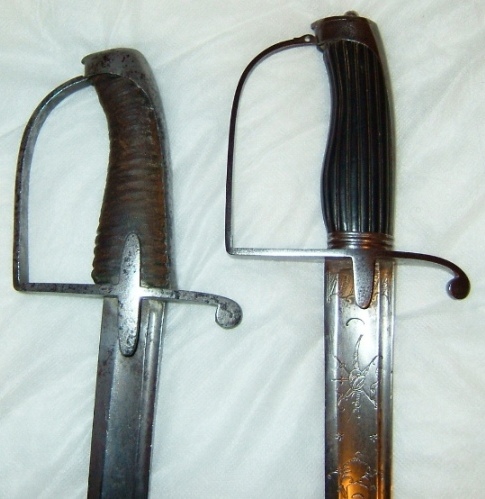
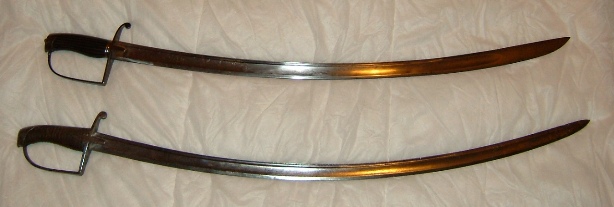
And back to infantry:
And also some of my British light infantry sabres from top
circa 1790, circa 1800, circa 1800, 1803 flat blade, 1803 ivory hilt - for staff officers, 1803 standard
 Attachment: 99.03 KB
Attachment: 99.03 KB
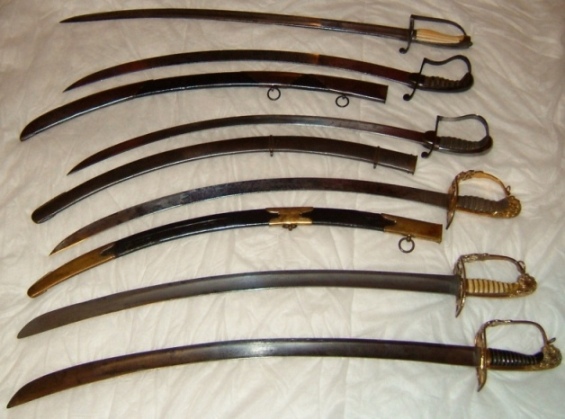
And also some of my British light infantry sabres from top
circa 1790, circa 1800, circa 1800, 1803 flat blade, 1803 ivory hilt - for staff officers, 1803 standard

Page 1 of 2
You cannot post new topics in this forumYou cannot reply to topics in this forum
You cannot edit your posts in this forum
You cannot delete your posts in this forum
You cannot vote in polls in this forum
You cannot attach files in this forum
You can download files in this forum
All contents © Copyright 2003-2006 myArmoury.com — All rights reserved
Discussion forums powered by phpBB © The phpBB Group
Switch to the Full-featured Version of the forum
Discussion forums powered by phpBB © The phpBB Group
Switch to the Full-featured Version of the forum